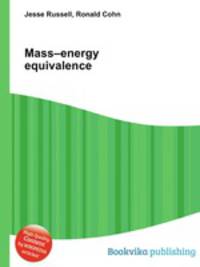Поиск книг, учебников, пособий в онлайн-магазинах

Mass–energy equivalence
Автор: Jesse Russell,Ronald Cohn, 84 стр., издатель: "Книга по Требованию", ISBN: 978-5-5131-0617-3High Quality Content by WIKIPEDIA articles! In physics, mass–energy equivalence is the concept that the mass of a body is a measure of its energy content. In this concept, mass is a property of all energy, and energy is a property of all mass, and the two properties are connected by a constant. This means (for example) that the total internal energy E of a body at rest is equal to the product of its rest mass m and a suitable conversion factor to transform from units of mass to units of energy. Albert Einstein proposed mass–energy equivalence in 1905 in one of his Annus Mirabilis papers entitled "Does the inertia of a body depend upon its energy-content?" The equivalence is described by the famous equation: Данное издание представляет собой компиляцию сведений, находящихся в свободном доступе в среде Интернет в целом, и в информационном сетевом ресурсе "Википедия" в частности. Собранная по частотным запросам указанной тематики, данная компиляция построена по принципу подбора близких...
Рейтинг книги: 



 5 из 5, 4 голос(-ов).
5 из 5, 4 голос(-ов).




 5 из 5, 4 голос(-ов).
5 из 5, 4 голос(-ов).




